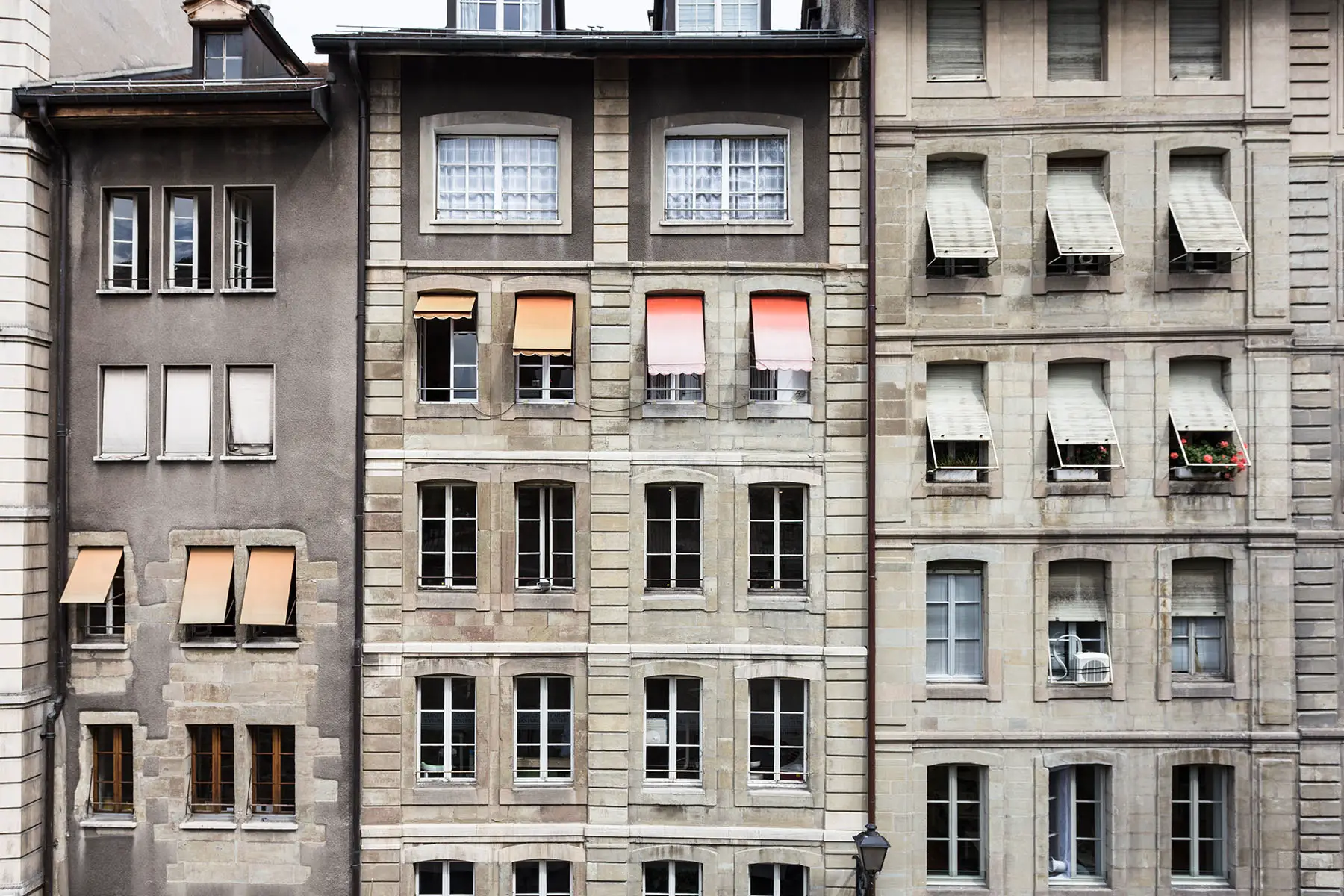Whether your salary requires it or you’re just scoping out the property market, renting a home is always a viable option. Keep in mind, however, that the rental market in Switzerland is fiercely competitive, especially when it comes to sought-after apartments in the likes of Geneva and Zürich. This means you need to be organized and ready to make your move when a suitable property becomes available.
Discover what you need to know about renting in Switzerland, including the following:
- Renting in Switzerland
- Popular places to rent in Switzerland
- Buying vs renting in Switzerland
- Types of property to rent in Switzerland
- Finding a place to rent in Switzerland
- Student housing in Switzerland
- How to rent a property in Switzerland
- How much is it to rent in Switzerland
- Social housing in Switzerland
- Renting contracts in Switzerland
- Other things to keep in mind
- Moving in and moving out
- Tips for renters in Switzerland
- Useful resources
Renting in Switzerland
The majority of people living in Switzerland rent rather than own a property. The country has the highest percentage of renters of any major European Union (EU) member state – 58% compared to an EU average of just 30% in 2021.
The high tenant population is also reflected in the percentage of people who live in apartments (63%, well above the EU average of 46%). While apartment living is common in the largest Swiss cities, there is a range of other property types available in more rural areas.

The good news for tenants is that renting conditions in Switzerland are better than in most other countries. There are strong tenant rights, with limits on rent increases and arbitration options if disputes occur with a landlord.
Another big plus of apartments is that the country’s culture of long-term renting means many blocks have a sense of community, as well as their own green space and communal parking.
Popular places to rent in Switzerland
Geneva
Geneva is a truly international city, home to the United Nations and World Health Organization. Although the spoken language is French, the city boasts a melting pot of different cultures and languages.
As such, it is also the most high-priced city in Switzerland to rent a home. The city center is home to many family-sized three and four-bedroom apartments, though these can be very expensive.
Some expats choose to look further afield in search of better value and use the city’s excellent public transport system to commute to work. Others head over the nearby French border in search of more affordable accommodation.
Zürich
Zürich is Switzerland’s largest city and financial capital. Although it’s expensive to rent there, it has slightly lower property prices than Geneva. The closer you get to the center, the more expensive property becomes.
Homes with gardens are relatively uncommon, and some buildings are under historic protection, resulting in very high rents. Many expat families choose to settle near the two main international schools on either side of the lake.
Commuting from France or Germany
Strong transport connections with neighboring countries mean that Swiss cities – including Geneva and Basel – are within commuting distance. If your work permit allows (if you’re an EU citizen, for example, or are working for a UN agency), you might consider living across the border where property prices are cheaper.

Life as a so-called frontalier (i.e., renting in France, Germany, or Italy while living in Switzerland), can be complicated. However, many people find it worthwhile for the financial benefits, particularly if they are only staying for a limited time or have come from another Eurozone country.
Buying vs renting in Switzerland
Renting will allow you to settle into Swiss life without having to commit to owning a property. Another good reason to rent rather than buy is that housing prices can be very high, especially in areas where the demand is higher than the supply.
Foreigners also face some restrictions on buying property in Switzerland, with exact eligibility rules varying from canton to canton. For example, some areas require you to have lived there for at least five years. You read more about this in Expatica’s article on buying real estate in Switzerland.
Then again, finding a place to rent in Switzerland can be very challenging. You’ll need to be alert and active to find a suitable property. It’s not unusual for properties in the largest Swiss cities to have many suitors, and in some cases, they’re rented out before they’ve even made it onto the estate agent websites.
Types of property to rent in Switzerland
Swiss listings describe properties by the total number of rooms, not counting bathrooms. This isn’t always consistent – for example, some agents count the kitchen and others don’t – so you’ll need to closely inspect adverts.
Many properties are rented out unfurnished. In some instances, this means they won’t even have kitchen appliances or light fittings. In apartments, however, communal laundry facilities will often be available in the building.
Outdoor space is a key selling point for Swiss tenants. Many modern apartments have a balcony and access to a communal garden or playground. Properties near bodies of water such as Lake Geneva or Lake Zürich will be more expensive, as the legal rights to access the water and moor a boat (if applicable) are factored into the cost of the property.
Finding a place to rent in Switzerland
The first step is to research an area where you might want to live and learn about property prices. You can start by searching online property portals, which list homes from a variety of local and national estate agents.

Estate agents
Once you’re ready to step up your search, you might want to register with a local estate agent. Estate agents will sometimes rent out properties without advertising them. Instead, they’ll contact applicants who’ve already registered on a first come, first served basis.
In popular areas, time is of the essence. If you’re not the first to apply for the property, you might arrive at the viewing to find it’s already been rented out.
Switzerland has lots of smaller, local estate agents that might not have a significant online presence. It’s therefore recommended you also visit your local agent in person.
Newspapers and supplements
Some daily newspapers include weekly property listings, and you might find free property supplements in supermarkets, estate agents, and on commuter trains.
Housing cooperatives
Some apartments in Switzerland are owned by housing cooperatives rather than a private landlord. To rent one of these properties, you’ll need to become a member of the cooperative, which usually means there are extra costs involved. However, membership also means you’ll have a right to vote on any decisions made about the building.
Temporary housing and furnished apartments
Subletting is both legal and common in Switzerland and is a good way to find temporary accommodation. The best places to find sublets are usually among your network of friends and acquaintances, and on the internal message boards of large organizations (e.g., if you work at the UN).
Furnished houses are often vacation homes, which might be a good option for a short time but can be more expensive. There are several online portals that focus on furnished apartments, such as:
Student housing in Switzerland
If you’re an international student moving to Switzerland, you’ll usually have lower costs when you choose to live in a dormitory or shared accommodation. Many universities offer housing that cost between CHF 500 and CHF 800 per month, depending on the city.

Some students prefer to find their own shared homes, while others choose to move in with Swiss families during their studies.
How to rent a property in Switzerland
Application form
Landlords seem to generally work on a first-come, first-served basis. That’s why, in a competitive area, you’ll want to hand in your application as soon as possible. Application forms can vary, but you’ll typically need to provide:
- Your name, age, marital status, and number of children
- Your profession, employer, and salary
- A reference letter from your employer
- Your residency or visa status and copies of documents
- How long you’d want to rent the property for
- Whether you have a pet (this isn’t always allowed)
Often, landlords will also require an excerpt from the debt enforcement register (French: extrait du Registre des poursuites, German: Auszug aus dem Betreibungsregister, Italian: estratto del registro dell’Ufficio delle Esecuzioni e Fallimenti, Romanish: extract dal register da scussiun). This confirms you have no outstanding debts or legal judgments. You can order this online from the Swiss Post website or in person at your canton’s debt enforcement office.
Signing the tenancy agreement
Once you’ve decided on a property, you’ll need to sign a tenancy agreement and pay a deposit (more on this later). Be sure to read the contract carefully and ask for advice if you’re unsure about any terms – most local communes have advice centers that offer help.
Before you move in, you’ll check the apartment together with the landlord, and agree on a written inventory of any defects and what’s included in the property.
How much is it to rent in Switzerland
Renting a property does not only include monthly rent, but also:
- Rental deposit
- Agency/administration fees
- Other costs (e.g., utility bills)
Monthly rent
The average monthly rent for apartments is around CHF 1,560, with 80% of properties falling between CHF 890 and CHF 2,860. For houses, the median is around CHF 2,500 in 2023, with 80% of properties being priced between CHF 917 and CHF 5,000 per month.
As with everywhere else, how much you’ll pay in rent depends on where you choose to live. Geneva has the highest average rent per square meter, followed by the cities of Grisons, Zug, and Zürich.

One thing to be aware of is that rent costs in Switzerland are influenced by the mortgage reference rate, which is calculated by the Federal Office of Housing. This rate is important in determining rents: when it rises, mortgages become more expensive to landlords, and the cost is then passed on to tenants. Just over half of rental contracts in Switzerland are based on the reference rate.
Rental deposit
By law, rental deposits in Switzerland must be a maximum of three months’ rent. Deposits are paid into a special rental deposit bank account, which is held in your (the tenant’s) name. When you move out of the property, the landlord can apply to withhold some of the deposit (e.g., to cover any damages). However, if they agree to release the full deposit, it’ll be returned to you with interest.
Agency/administration fees
If you’re renting through an estate agent, you can be charged search and application fees. These vary significantly from agent to agent but can add up to as much as one month’s rent.
Renting directly from a landlord result in lower fees; they are legally banned from charging finding fees.
Other costs
Monthly rent typically includes water rates. However, you will have to pay utility bills for gas and electricity. There is often also a service fee for the care and maintenance of communal areas.
When you view the property, it’s important to double-check what is and what isn’t included in the tenancy agreement. For example, landlords should not charge you for the service fee and must provide a detailed invoice at least once per year.
Social housing in Switzerland
If you can’t afford to rent a property on the regular market, you might be able to access subsidized social housing. There’s relatively little of this in Switzerland, but the properties that are available are usually subject to an income cap that excludes most full-time employees.
Social housing is over-subscribed and thus rarely listed, but if they are advertised, this income cap will often, but not always, be mentioned in the ad. If an offer sounds too good to be true, it probably is.
Renting contracts in Switzerland
All renters should have a written tenancy contract confirming the details of the deal. This should include:
- Monthly rent, to be paid at which date
- Start and end date of your tenancy
- Notice period
- A detailed property inventory
- Any shared services (e.g., communal garden)
- Any quiet hours
- Any other house rules
- Any other terms and conditions
Swiss renting contracts usually last for an initial period of 12 months. You can find out more about notice periods in the ‘moving out’ section below.
Tenant rights and obligations
When renting a property in Switzerland, you’ll need to keep to the terms stated on your tenancy contract. If you want to make changes to the property (e.g., painting the entire apartment black), you’ll need to get permission from your landlord first.

You’ll also need to be aware of the Swiss tradition of quiet hours. It’s custom to show consideration to your neighbors by limiting noise overnight (22:00-07:00), at lunchtime (12:00-13:00), and all day on a Sunday. If you wish to throw a party, you should inform your neighbors in advance.
Landlord rights and obligations
Property owners are allowed to choose any renter for their house or apartment. That said, they cannot legally use discriminatory criteria to make their decision.
Landlords often use a property manager or rental agent to deal with renters. If this is the case, you must contact the agent directly to report any problems. Larger apartment blocks will have designated caretakers, who are responsible for the upkeep of common areas, minor repairs, and building maintenance.
If the owner wishes to increase the rent, they must fill out a form and justify the decision. For example, they can up the rent for renovations or, more often, changes to the mortgage reference rate. In some cantons, landlords must include an appeal form so tenants can object if they believe their rent is excessively high.
You may have the right to request a rent reduction if the mortgage reference rate decreases or maintenance work affects your enjoyment of the property.
Where to go in the event of a dispute
If your landlord increases your rent, you have 30 days to appeal to your local branch of the housing arbitration agency, also known as the conciliation authority (French: Autorité de conciliation, German: Schlichtungsstellen, Italian: Ufficio di conciliazione).
Other things to keep in mind
Tenants are usually responsible for utilities (excluding water), internet, and TV, though this will be specified in the tenancy agreement.
You should also take out home contents insurance when renting a property. This protects your belongings in case of damage or break-ins. Your landlord must take out buildings insurance to cover damage to the property itself.
Garbage is collected once or twice a week depending on the canton. You must use official garbage bags, which can be purchased in local shops. Recycling is collected separately or can be disposited at your local collection point.
Moving in and moving out
If you want to move out of a property, you’ll need to adhere to the notice period that is mentioned in your contract.

Notice should be given by letter, and married couples must both sign for it to be valid. If you want to move out mid-contract, you might be allowed to do so if you can find a new tenant to replace you. However, if the landlord doesn’t agree, you’ll need to continue paying rent until the contract ends.
The property owner can only terminate the rental agreement by filing an official form. You then have 30 days to contest it with the conciliation authority.
When leaving the property, you must make sure it is clean. As with when you first moved in, you’ll complete an inventory to confirm the condition of the property and locate any defects. If there are any disputes over who should pay to fix an issue, you must mention these in the report.
If you can’t resolve the dispute, your local canton’s conciliation authority can moderate it for free.
Tips for renters in Switzerland
- Don’t pay anything before viewing the property and signing a contract
- Take pictures of the property when you move in and keep them in case of any disputes
- If the property needs repairs, discuss them with the owner before signing the contract
- Confirm with your landlord what fees and responsibilities are part of the contract
- Check the policy on having pets. Even if there is a clause against this, you might be able to negotiate with the landlord.
- Avoid getting caught off guard and ask the owner where the fusebox is, as well as any other quirks
- Write down or take a picture of all the utility meters when you move in. You will need to provide initial readings to utility providers so they can start calculating your annual bill.
Useful resources
- Federal Office of Housing (Bundesamt für Wohnungswesen – BWO) – official government resource for all housing issues
- Renting in Switzerland – a basic information booklet from the Swiss government about renting in Switzerland. It is available in 19 different languages.




